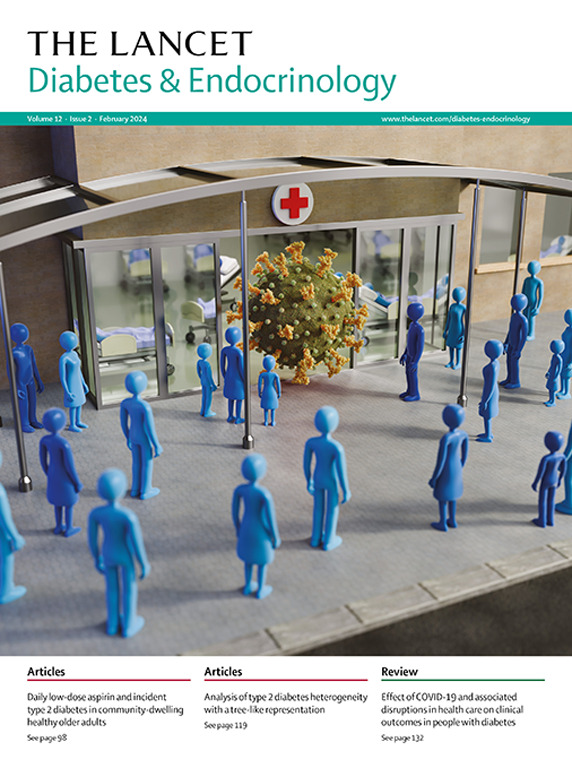Association between maternal diabetes and neurodevelopmental outcomes in children: a systematic review and meta-analysis of 202 observational studies comprising 56·1 million pregnancies
IF 44
1区 医学
Q1 ENDOCRINOLOGY & METABOLISM
引用次数: 0
Abstract
Background
Maternal diabetes might alter fetal brain development. However, well-designed systematic analyses are needed to comprehensively assess and quantify the association between maternal diabetes and neurodevelopmental outcomes in children. We aimed to synthesise and evaluate the available evidence on the effects of maternal diabetes on neurodevelopmental outcomes in children.Methods
For this systematic review and meta-analysis we searched PubMed, Web of Science, Embase, and EBSCO databases from inception to Dec 1, 2024, for studies exploring neurodevelopmental outcomes of children born to mothers with diabetes. The primary outcome was neurodevelopmental disorders, as defined by the Diagnostic and Statistical Manual of Mental Disorders, Fifth Edition and International Classification of Diseases 11th Revision. Data were extracted from published reports. Data were pooled with random-effects models and presented as risk ratios or standard mean differences with 95% CIs. This study was prospectively registered on PROSPERO (CRD42023395464).Findings
202 studies, involving 56 082 462 mother–child pairs, were included in the meta-analysis. Of these, 110 (54%) examined gestational diabetes, while 80 (40%) investigated pre-gestational diabetes. Among the total studies reviewed, 169 (84%) exclusively focused on children and adolescents aged up to 18 years. In studies adjusting for at least one key confounder, maternal diabetes was associated with increased risks of all types of neurodevelopmental disorders as well as lower intelligence and psychomotor scores. In studies adjusting for multiple confounders (n=98, 49%), children exposed to maternal diabetes had an increased risk of any neurodevelopmental disorder (risk ratio 1·28; 95% CI 1·24–1·31), autism spectrum disorder (1·25; 1·20–1·31), attention-deficit hyperactivity disorder (1·30; 1·24–1·37), intellectual disability (1·32; 1·18–1·47), specific developmental disorders (1·27; 1·17–1·37), communication disorder (1·20; 1·11–1·28), motor disorder (1·17; 1·10–1·26), and learning disorder (1·16; 1·06–1·26), compared with unexposed children. Maternal pre-gestational diabetes was more strongly associated with the risk of most neurodevelopmental disorders in children than gestational diabetes (risk ratio 1·39; [95% CI 1·34–1·44] vs 1·18 [1·14–1·23]; subgroup difference p<0·0001).Interpretation
Maternal diabetes is associated with an increased risk of neurodevelopmental disorders and impaired neurodevelopmental performance in children. Further high-quality research is needed to establish causality and clarify the associations between specific types of diabetes and the full spectrum of neurodevelopmental disorders.Funding
The National Natural Science Foundation of China, and the Science and Technology Innovation Program of Hunan Province.Translation
For the Mandarin translation of the abstract see Supplementary Materials section.求助全文
约1分钟内获得全文
求助全文
来源期刊

The Lancet Diabetes & Endocrinology
ENDOCRINOLOGY & METABOLISM-
CiteScore
61.50
自引率
1.60%
发文量
371
期刊介绍:
The Lancet Diabetes & Endocrinology, an independent journal with a global perspective and strong clinical focus, features original clinical research, expert reviews, news, and opinion pieces in each monthly issue. Covering topics like diabetes, obesity, nutrition, and more, the journal provides insights into clinical advances and practice-changing research worldwide. It welcomes original research advocating change or shedding light on clinical practice, as well as informative reviews on related topics, especially those with global health importance and relevance to low-income and middle-income countries. The journal publishes various content types, including Articles, Reviews, Comments, Correspondence, Health Policy, and Personal Views, along with Series and Commissions aiming to drive positive change in clinical practice and health policy in diabetes and endocrinology.
 求助内容:
求助内容: 应助结果提醒方式:
应助结果提醒方式:


